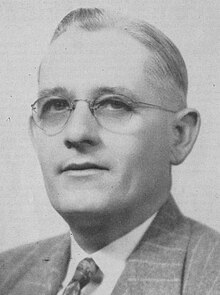
Back فيلدينغ إل. رايت Arabic فيلدينج ال. رايت ARZ فیلدینق ال. رایت AZB Fielding L. Wright German Fielding L. Wright Spanish Fielding Ludovicus Wright Latin Fielding L. Wright SIMPLE Fielding L. Wright Swedish
Fielding L. Wright | |
|---|---|
 | |
| 49th and 50th Governor of Mississippi | |
| In office November 2, 1946 – January 22, 1952 | |
| Lieutenant | Sam Lumpkin |
| Preceded by | Thomas L. Bailey |
| Succeeded by | Hugh L. White |
| 19th Lieutenant Governor of Mississippi | |
| In office January 17, 1944 – November 2, 1946 | |
| Governor | Dennis Murphree Thomas L. Bailey |
| Preceded by | Dennis Murphree |
| Succeeded by | Sam Lumpkin |
| 54th Speaker of the Mississippi House of Representatives | |
| In office September 14, 1936 – January 2, 1940 | |
| Preceded by | Horace Stansel |
| Succeeded by | Sam Lumpkin |
| Acting Speaker of the Mississippi House of Representatives | |
| In office February 1936 – September 14, 1936 | |
| Member of the Mississippi House of Representatives | |
| In office January 5, 1932 – January 2, 1940 | |
| Member of the Mississippi State Senate from the 20th District | |
| In office 1928 – January 5, 1932 | |
| Personal details | |
| Born | Fielding Lewis Wright May 16, 1895 Rolling Fork, Mississippi, U.S. |
| Died | May 4, 1956 (aged 60) Jackson, Mississippi, U.S. |
| Political party | Democratic |
| Other political affiliations | Dixiecrat (1948) |
| Spouse | Nan Kelly |
| Education | Gardner–Webb University University of Alabama (LLB) |
| Military service | |
| Allegiance | |
| Branch/service | United States Army |
| Years of service | 1918–1919 |
| Rank | Private |
| Unit | 38th Infantry Division 105th Engineer Combat Battalion[1] Mississippi National Guard |
| Battles/wars | World War I |
Fielding Lewis Wright (May 16, 1895 – May 4, 1956) was an American politician who served as the 19th lieutenant governor and 49th and 50th governor of Mississippi. During the 1948 presidential election he served as the vice presidential nominee of the States' Rights Democratic Party (Dixiecrats) alongside presidential nominee Strom Thurmond. During his political career he fought to maintain racial segregation, fighting with President Harry S. Truman over civil rights legislation, and holding other racist views.
Wright grew up in Rolling Fork, Mississippi, where he was educated and later attended Gardner–Webb University and the University of Alabama. During World War I he was sent to France as a captain. Wright served in the 149th Machine Gun Battalion and the 105th Engineer Combat Battalion before being honorably discharged in 1919. Following his service in the United States Army, he joined the Mississippi National Guard.
After entering politics in the 1920s, Wright was elected to the state legislature, where he served in the late 1920s and through the 1930s. Following the death of Speaker Horace Stansel, he rose to the speakership of the state House of Representatives. After a brief absence from politics, Wright was elected as Mississippi's lieutenant governor and served until he ascended to the governorship following the death of Thomas L. Bailey on November 2, 1946. During his gubernatorial tenure he made efforts to maintain racial segregation and supported Senator Theodore G. Bilbo, a member of the Ku Klux Klan and segregationist, in his attempt to maintain his seat in the United States Senate.[2][3]
Wright was elected to a term in his own right in the 1947 election. In his inaugural address, he voiced opposition to Truman's support of civil rights and called for Southern Democrats to leave the Democratic Party. He served as a leader of the States' Rights Democratic Party, declining offers to run for the presidential nomination, although he later accepted the vice-presidential nomination. In the presidential election, Thurmond and Wright won multiple Southern states, but failed to prevent Truman from winning the presidential election. Wright completed his gubernatorial term on January 22, 1952, and retired from public service. He unsuccessfully sought the Democratic nomination in the 1955 Mississippi gubernatorial election, and died on May 4, 1956.
- ^ Cite error: The named reference
wright life 2was invoked but never defined (see the help page). - ^ "McClatchy Washington Bureau | 01/07/2009 | Obama's new home was slow to accept integration". Archived from the original on January 22, 2009. Retrieved October 26, 2011.
- ^ "Sen. Theodore G. Bilbo's Legacy of Hate". Common Dreams. July 17, 2007. Archived from the original on February 21, 2014. Retrieved August 10, 2016.